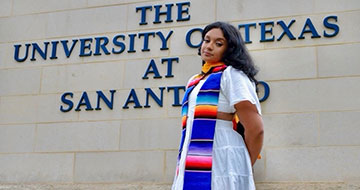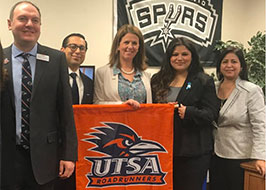Are you passionate about justice and making a difference in your community?
The Department of Criminology and Criminal Justice at UT San Antoniooffers both bachelor's and master's degrees, designed to equip you with the knowledge and skills you need to excel.
Our programs emphasize research and policy, ensuring that you will be well-prepared to tackle the complex issues facing our criminal justice system today. Whether you're interested in law enforcement, corrections, or working in governmental agencies, our curriculum covers it all, and our faculty have decades of experience in the field.
But it’s not just about the classroom experience. Our department prides itself on strong connections throughout San Antonio, placing graduates in local, state, and federal agencies. From the San Antonio Police Department to federal organizations, our alumni are making a real impact.
Ready to take the next step? Contact us to learn more about our programs and how you can start your journey towards a rewarding career in criminal justice.


“Throughout my studies, I developed a strong interest in the implementation and evaluation of policies within the criminal justice system, with a keen focus on assessing their effectiveness in achieving their intended objectives.”
Criminology and Criminal Justice Fast Facts
Come Join Us! Still deciding if a criminology and criminal justice degree is right for you? Here are some fast facts about our department to help you.
Summer camp
We host a Summer Camp for high school juniors and seniors and incoming freshman. They receive an overview of the criminal justice system and learn about crucial research, interact with experts in the field, visit federal and county courthouses, Bexar County Emergency Management Office, and San Antonio Police Department Headquarters, and apply scientific theory while examining a mock crime scene and participate in a mock trial.Transfer Students
Transfer Students welcome! Over 55% of our junior and senior criminology and criminal justice majors are transfer students.Learning from experts
Many criminal justice leaders regularly teach classes in our program. Recent instructors include Bexar County District Attorney’s Office Chief of the Violent Crimes Division, a Bexar County Judge, Chief U.S. Probation Officer for the Western District of Texas, a former lieutenant and deputy director of the joint regional intelligence center for LAPD, and a forensic scientist in the Bexar County Crime Lab.Study Abroad
Expand your horizons! We have a rich tradition of providing study abroad opportunities to our students and recently took a group of students on a short-term study abroad to Spain in May of 2025.Get involved
Join Alpha Phi Sigma, the Criminal Justice National Honor Society. Each year, APS students host a campuswide conversation with police officers from SAPD and our UT San Antonio Police Department. We meet with other criminal justice leaders such as the Bexar County District Attorney, and judges from the Federal and County Court Houses. APS members also give back to the community by volunteering with the Bexar County Reentry Center’s 2nd Chance Job Fair and collecting donated toys for our annual toy drive for UT San Antonio's Westside Community Center.Career Readiness
Ensuring our students are ready for the world of work is a top priority. We have a dedicated Internship Coordinator who works with employers to provide internship opportunities for our students, who log more than 10,000 internship hours every semester. We also host a Career Day each semester where our majors meet with dozens of employers in the field and network with alumni.Department mission
Latest News
Read All News Stories
September 11, 2025
Saving lives and futures: North Texas leaders focus on hope in tackling teen violencePublished by The Dallas Morning News

July 22, 2024
Former foster youth defies the odds to earn three UTSA degreesPublished by UTSA Today

May 16, 2024
HCAP graduates first cohort of Bold Promise students
